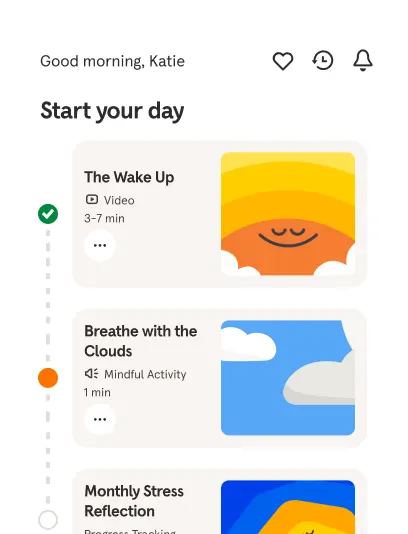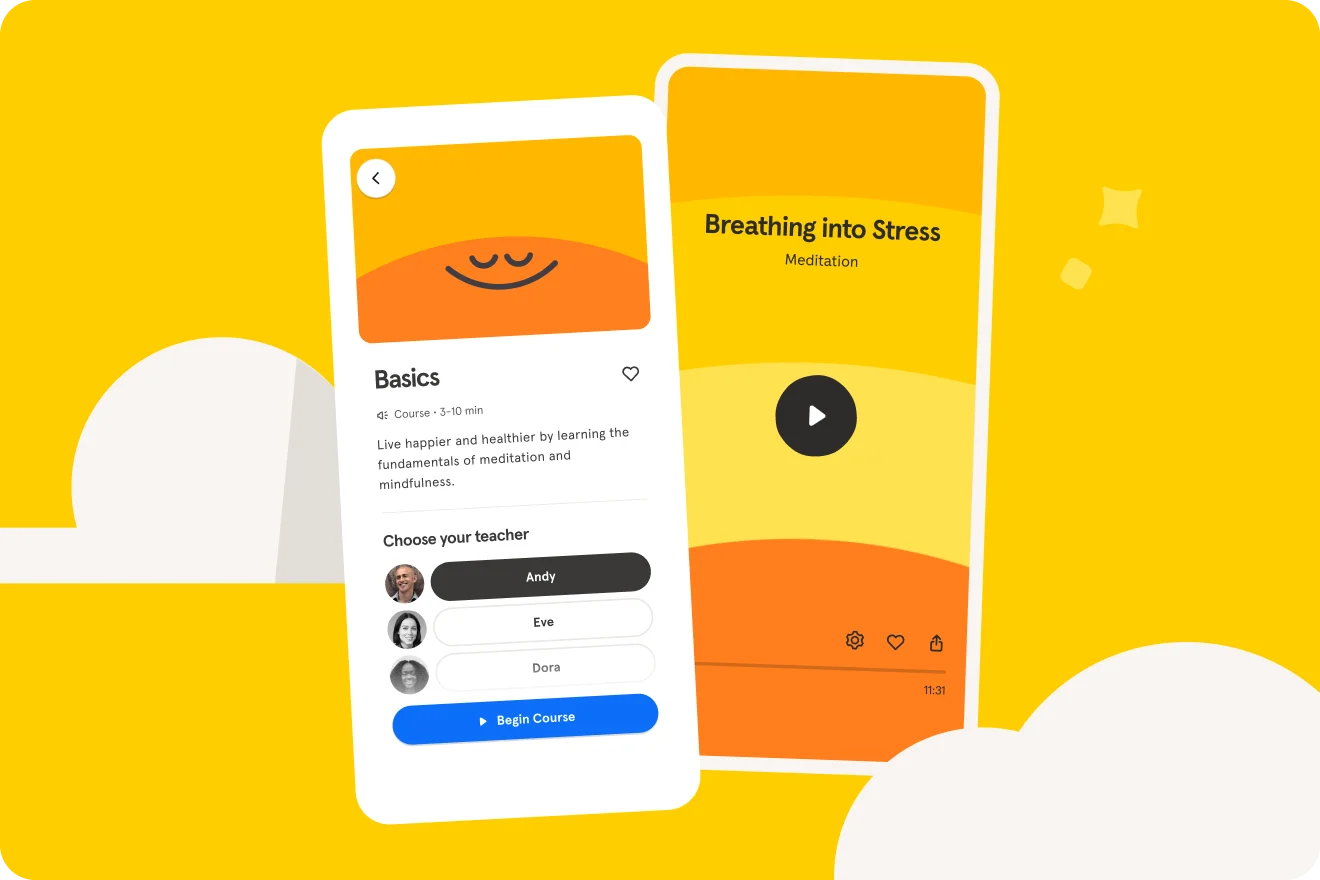Excitement
Here are some tips on how you can relieve the restlessness that comes from feeling excited.
Try 14 days freeBetter mental health starts with Headspace. Unrivaled expertise to make life feel a little easier, using guided meditations, mindfulness tips, focus tools, sleep support, and dedicated programs.
Try 14 days free
It's hard to imagine that excitement would be a problem that alone, an obstacle, and yet within the context of cultivating a calm, clear mind, of course, it can be very much of an obstacle. It can be experienced as a sense of restlessness, as a sense of kind of almost intensity in the body, and in the mind, of course. And it's interesting, there's maybe not such a big difference between excitement and anxiety if you think about when you've chosen to go and do something, which is a little bit scary, but also quite exciting, you're doing it for pleasure. I think going on a roller coaster is perhaps the best example. So the feeling can kind of change, you know, there's a, it's a nervous kind of excitement even, and one person will experience it as pure anxiety, and they'll bail out of the last minute and say, no, thanks, it's not for me. And another person might experience it as sheer kind of joy and can get sort of carried away in it. So the way we approach the feeling of excitement is actually not that different to the way we approach a feeling of anxiety. The only difference is that with excitement, we tend to associate it as being positive. So we tend to chase after it. We tend to be happy kind of chasing after those thoughts and being involved in that conversation in our own mind whereas with anxiety, of course, we tend not to like the feeling so much. It's not such a positive association, and so, we tend to kind of resist the thoughts a little more, but either way, whether we're chasing after thoughts or resisting thoughts, we're still creating more chatter in the mind, and that chatter is preventing the mind from calming down. So as much as possible, once we've seen that tendency to kind of, even if it's excited about sitting down and doing Headspace for the very first time or because you haven't done it for a long time, still just recognizing that getting caught up in that conversation, and excitement has to be driven by a conversation, at some, in the mind, you know. So at some stage there has been a thought or a chain of thoughts which has created or stimulated that feeling of excitement and it's only sustained kind of by giving it more attention. So as soon as we've seen that and we've let go of it and we've come back, of course, absolutely fine just to sit there and to experience the feeling of excitement, to be present with it, to enjoy it, but not to encourage it. And I think when we do that, when we approach excitement in that way, then not only does the mind start to calm down a little bit, but it calms down with a sense of sort of happiness and joy. So there's none of the frustration of kind of trying to change...
Details
About your teachers
- More about Andy
A former Buddhist monk, Andy has guided people in meditation and mindfulness for 20 years. In his mission to make these practices accessible to all, he co-created the Headspace app in 2010.
- More about Eve
Eve is a mindfulness teacher, overseeing Headspace’s meditation curriculum. She is passionate about sharing meditation to help others feel less stressed and experience more compassion in their lives.
- More about Dora
As a meditation teacher, Dora encourages others to live, breathe, and be with the fullness of their experiences. She loves meditation’s power to create community and bring clarity to people’s minds.
- More about Kessonga
Kessonga has been an acupuncturists, therapist, and meditation teacher, working to bring mindfulness to the diverse populations of the world.
- More about Rosie
Rosie Acosta has studied yoga and mindfulness for more than 20 years and taught for over a decade. Rosie’s mission is to help others overcome adversity and experience radical love.

Your lifelong guide to better mental health
Stress, sleep, and all the challenging emotions — care for your mind with the everyday mental health app that's shown to make a difference.
Try 14 days free
Look after your mind
Proven guided meditations and programs to help you stress less, sleep more soundly, and better navigate life’s challenges

Science-backed
Studies show that using Headspace for 30 days can reduce stress, increase resilience, and improve overall well-being

Explore 1000+ expert-led exercises
Access our library of meditations, breathing exercises, and guidance videos for stress, sleep, focus, everyday anxiety , parenting, and more.
Member reviews
Hear from some of our members
Your app brings so much peace and tolerance to our home.
Rachel
UK
Changing my thoughts has allowed me to change my life.
Davide
London
The stress and loneliness courses … taught me how to comfort myself.
Alicia
Canada
Headspace provides me with … a connection to myself, and a disconnection from negative thoughts, feelings, and sensations.
Keri
UK
Related to 'Excitement'
- © 2024 Headspace Inc.
- Terms & conditions
- Privacy policy
- Consumer Health Data
- Your privacy choices
- CA Privacy Notice

